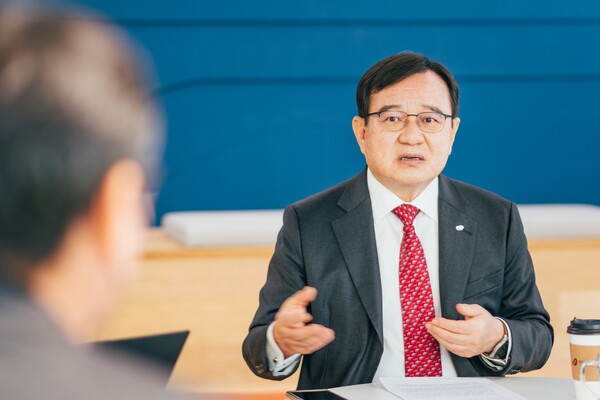Handok, which reaffirmed its strong position in the diabetes area with sales of 100 billion won ($80 million) in this sector last year, has thrown a gauntlet to the anticancer treatment market.
The company will also continue to secure competitive products to continue its growth pace, according to its top manager.

In a recent interview with Korea Biomedical Review, Handok Chairman and CEO Kim Young-jin said the company would strengthen its rare disease and anticancer business this year to secure a new growth engine. Aside from new drug development, he also unveiled a plan to expand the company’s open innovation platform, releasing digital treatments and nurturing bio startups.
“Handok has maintained growth yearly and continued to create new opportunities,” Chairman Kim said. “Our sales grew 5 percent last year to 536.6 billion won despite various challenging situations, such as the prolonged Covid-19 pandemic, commodity price hikes and interest rate increases due to Russia’s war in Ukraine, and expired contracts (for pulmonary artery hypertension treatments, Madopar, Culturelle).”
Handok provides all options regarding diabetes, from its management to treatment, including various treatments such as Tenelia and Amaryl, Medtronic’s continuous blood glucose meter and insulin pump, and glucose meter Barozen. These diabetes-related products recorded combined sales of 100 billion won last year.
In addition, it introduced new products such as Mircera and Renvela. Ketotop, an arthritis pain relief patch brand acquired in 2014, also did well in the generic drug market and supported the company's growth by recording sales of 50 billion won last year.
Kim said the company also would introduce Novartis’ new products (Onbrez, Xoterna, Enerzair, and Atectura) to enhance its pulmonary disease portfolio, put the anticancer business on the right track, and add rare and neurological disease treatments to maintain its growth momentum.
Most noteworthy among them will be Handok’s advance to the anticancer treatment market. It plans to release Vyxeos, an acute myeloid leukemia treatment that won approval last November and push to win nods for Insight’s new drugs, Pemigatinib and Tafasitamab.
“Handok’s weakness as a pharmaceutical company has been its failure to jump into the anticancer treatment market,” Kim admitted. “We will jump into the market in earnest this year. Aside from Insight’s two anticancer drugs, we will simultaneously conduct a phase 2/3 trial for independently developed treatment in the U.S. and Korea.
“The competition in the anticancer drug market is fierce, but we plan to introduce anticancer drugs that do not exist in Korea. We will expand business by introducing options that medical professionals need one by one,” he said. "I think our know-how accumulated in rare disease treatments will help us enter the anticancer drug market. In addition, we will expand investment in independent development (of new anticancer drugs). "
Handok has the experience of introducing Soliris, a paroxysmal nocturnal hemoglobinuria (PNH) treatment from Alexion Pharmaceutical, and growing it to a 30-billion-won blockbuster in just a decade. However, as AstraZeneca recently acquired Alexion, the domestic sales right of Soliris and its successor Ultomiris was transferred to AstraZeneca Korea. Therefore, from this year, AZ will sell these products in Korea.
Kim, expressing regrets over handing over profitable products, said he would introduce new items from abroad to recover the growth of rare disease treatment, as the company confirmed its potential in this market.
“Last year, we experienced difficulty due to the expiry of contracts for some products, including Madopar, but we continued to grow,” Chairman Kim said. “As we have accumulated experiences and competitiveness by winning approvals and conducting marketing in rare disease areas, we will find new innovative products, including Galafold, Defitelio, and Insight’s rare cancer drugs, and turn them into new hit items to maintain the growth of rare disease drug area.”
Kim also expressed expectations of releasing independently developed new drugs through its open innovation project. A frontrunner is HD-B001A, a next-generation anticancer therapy for biliary tract cancer patients for which the company recently announced the results of phase 2 clinical trials. HD-B001A showed a high objective response rate (ORR) of 63.3 percent in patients who were given secondary treatment in phase 2 results, confirming its potential as a new treatment option for biliary tract cancer with low survival rates and limited treatment options
Handok plans to secure additional data on its efficacy and safety from more patients in the upcoming global phase 2/3 clinical trial. It is also conducting a clinical trial of the drug in the U.S. and China as a treatment for colorectal cancer.
“As Korea grants conditional approval after phase 2 clinical trial, I expect to confirm a visible result by releasing HD-B001A as a new homegrown drug next year,” Kim said.
In addition, RZ358, a congenital high-insulin treatment developed with Rezolute, is preparing for a phase 3 clinical trial, and the diabetic macular disease treatment RZ402 has entered a phase 2 clinical trial.
“Handok will create profits and seek substantial growth,” Kim said. “To this end, we are making efforts for digital innovation, sustainable management, and organizational culture and will continue to do so in the future.”
Handok is discovering innovative seeds by launching its subsidiary Innocube upon completing the Handok Future Complex. Innocube is an accelerator that discovers and fosters bio and healthcare-specific startups. In addition to initial funding, it aims to contribute to establishing a healthy bio-venture ecosystem by providing comprehensive services, including infrastructure, such as shared research space and research equipment, project development consulting, and management support.
“It is important to strengthen the competitiveness of the company as well as external growth due to rapid changes and uncertainties in the external environment,” Chairman Kim said. “Handok will pursue substantial growth and continue its efforts for digital transformation, sustainable management, and organizational culture.”

